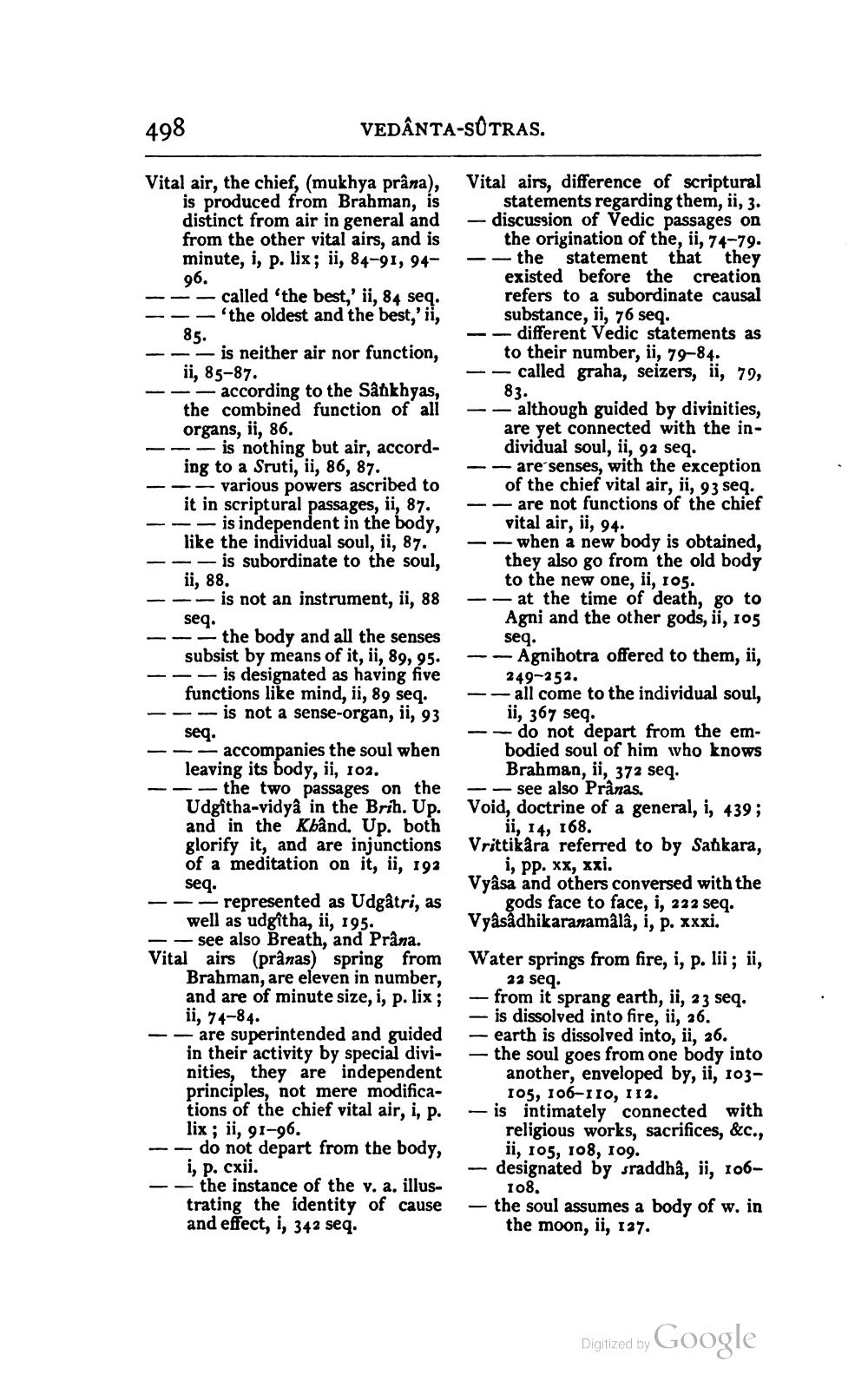________________
498
VEDÂNTA-SOTRAS.
Vital statement of Vediche, ii, 74 they
Vital airs, difference of scriptural
statements regarding them, ii, 3. - discussion of Vedic passages on
the origination of the, ii, 74-79. --the statement that they
existed before the creation refers to a subordinate causal
substance, ii, 76 seq. -- different Vedic statements as
to their number, ii, 79-84. - - called graha, seizers, ii, 79,
83.
Vital air, the chief, (mukhya prâna),
is produced from Brahman, is distinct from air in general and from the other vital airs, and is minute, i, p. lix; ii, 84-91, 94
96.
- - called 'the best,' ii, 84 seq. --- 'the oldest and the best,' ii,
85. --- is neither air nor function,
ii, 85-87. ---according to the Sankhyas,
the combined function of all
organs, ii, 86. - -- is nothing but air, accord
ing to a Sruti, ii, 86, 87. ---- various powers ascribed to
it in scriptural passages, ii, 87. --- is independent in the body,
like the individual soul, ii, 87. --- is subordinate to the soul,
ii, 88. - -- is not an instrument, ii, 88
seq. --- the body and all the senses
subsist by means of it, ii, 89, 95. -- - is designated as having five
functions like mind, ii, 89 seq. - -- is not a sense-organ, ii, 93
seq. - accompanies the soul when leaving its body, ii, 102. -- the two passages on the Udgitha-vidya in the Brih. Up. and in the Kbând. Up. both glorify it, and are injunctions of a meditation on it, ii, 192
seq. --- represented as Udgâtri, as
well as udgitha, ii, 195. -- see also Breath, and Prâna. Vital airs (prânas) spring from
Brahman, are eleven in number, and are of minute size, i, p. lix;
ii, 74-84. -- are superintended and guided
in their activity by special divinities, they are independent principles, not mere modifications of the chief vital air, i, p. lix ; ii, 91-96. - do not depart from the body, i, p. cxii.
the instance of the v. a. illustrating the identity of cause and effect, i, 342 seq.
-- although guided by divinities,
are yet connected with the in
dividual soul, ii, 92 seq. - - are senses, with the exception
of the chief vital air, ii, 93 seq. -- are not functions of the chief
vital air, ii, 94. -- when a new body is obtained,
they also go from the old body
to the new one, ii, 105. -- at the time of death, go to
Agni and the other gods, ii, 105
seq. -- Agnihotra offered to them, ii,
249-252. -- all come to the individual soul,
ii, 367 seq. --do not depart from the em
bodied soul of him who knows
Brahman, ii, 372 seq. -- see also Pranas. Void, doctrine of a general, i, 439;
ii, 14, 168. Vrittikära referred to by Sankara,
i, pp. xx, xxi. Vyâsa and others conversed with the
gods face to face, i, 222 seq. Vyâsâdhikaranamalâ, i, p. xxxi.
Water springs from fire, i, p. lii; ii,
22 seq. - from it sprang earth, ii, 23 seq. - is dissolved into fire, ii, 26. - earth is dissolved into, ii, 26. - the soul goes from one body into
another, enveloped by, ii, 103
105, 106-110, 112. - is intimately connected with
religious works, sacrifices, &c.,
ii, 105, 108, 109. - designated by sraddha, ii, 106
108. — the soul assumes a body of w. in
the moon, ii, 137.
Digitized by Google




